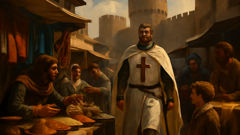Introduction
Sunlight streamed through the high, stained-glass windows of the court of Valencia, scattering a kaleidoscope of colors across the rush-strewn floor and polished armor. In this vibrant, bustling city—cradle of learning, commerce, and ambition—stories of chivalry and conquest were born, lived, and retold beneath tiled rooftops and ancient stone towers. The year was 1464, an era perched on the edge between tradition and transformation. The last traces of Moorish splendor lingered in shadowed courtyards, while Christian banners fluttered over the ramparts. Yet beneath all the pageantry, the clang of blacksmiths’ hammers and the hum of merchants’ voices, a new kind of hero was rising—a man not just of legend, but of flesh, blood, and contradiction. Tirant lo Blanch, a name whispered from the narrow alleyways of Valencia to the war camps outside Constantinople, would become more than a knight in shining armor. His story was not gilded by fantasy alone, but burnished by the real grit of sweat, heartbreak, and hard-won honor. He was bold, impulsive, fiercely loyal, and sometimes all too human. In his world, love was as complex as war; courage demanded both cunning and humility; and the true measure of a hero was not found in unblemished myth, but in the struggle to remain just and compassionate amid cruelty and chaos. Here, in the streets and courts of medieval Spain, the tale of Tirant lo Blanch unfolds—a tapestry of intrigue, fierce battles, courtly maneuvering, and the searching hearts of those who dared to hope for a better world. Let us step into these sun-dappled halls and blood-stained fields, where destinies are forged not just by the sword, but by wit, devotion, and the resilience of the human spirit.
A Knight in the City of Silk
The city of Valencia, with its narrow, winding streets and sun-baked plazas, was more than a mere backdrop to Tirant lo Blanch’s rise—it was his crucible. Within these city walls, the bustling silk market competed with the scent of roasting chestnuts and the distant clangor of swordplay. Caravans arrived from Genoa and Granada, bringing not only fine cloth and exotic spices but rumors, ambitions, and the shadow of war. For Tirant, recently returned from a minor campaign in Aragon, the city was both home and proving ground.

On this particular spring morning, the city’s rhythm seemed to pulse with expectation. Tirant strode through the marketplace, his armor modest but burnished, a white surcoat bearing his emblem—a silver falcon clutching a rose—catching the eyes of vendors and apprentices alike. Though young, his reputation already preceded him. Unlike other knights, who courted attention with boastful tales or ostentatious displays, Tirant moved with a quiet confidence. He greeted the old Moorish scholar at his bookstall with the same respect he showed the city’s captains. Valencia’s melting pot of cultures—Jewish scribes, Christian knights, Moorish poets—formed the very fabric of Tirant’s upbringing. He had learned to speak three tongues, to read both scripture and romance, and to wield his sword not only against foes but as a symbol of justice.
Yet ambition was never far behind. News had reached Valencia’s court that King Joan II of Aragon sought a champion for a campaign beyond the sea. The distant Byzantine Empire, besieged by Ottoman forces, had appealed for aid. The city’s noble families buzzed with opportunity and anxiety. Would their sons ride east to glory—or to ruin? At the center of these swirling currents, Tirant received a summons to the palace.
The hall was filled with lords in brocaded finery and grim-faced captains. Queen Isabella’s eyes lingered on Tirant as he entered; she had seen too many brash young knights come to grief. But the king’s gaze was shrewd. He questioned Tirant not just about tactics or lineage, but about forbearance, fairness, and the burdens of command. Tirant answered with a careful honesty that set him apart. The appointment was his: captain of a company bound for Constantinople. He was charged not only with winning battles, but with forging alliances, keeping discipline, and—perhaps hardest of all—preserving his own soul amid blood and betrayal.
That evening, as sunset turned Valencia’s rooftops to copper, Tirant visited his old mentor, Friar Jaume. The friar reminded him that chivalry was not armor against sorrow. “You’ll be tempted by pride, anger, and even despair,” he said, “but remember—true courage is not the absence of fear, but doing what’s right despite it.” Tirant spent the night composing a letter to Carmesina, the king’s ward—a woman whose wit and beauty had ensnared his heart. He wrote not promises of impossible feats, but a pledge to return to her with honor, however scarred.
When dawn came, Tirant mounted his horse outside the city gates. As he set out, the bells of Valencia rang behind him, blending with the distant roar of the sea—a reminder that the world was vast, unpredictable, and waiting for heroes who dared to be more than legend.
Siege and Shadows: The Campaign in Byzantium
The voyage east was long and fraught with danger. Tirant’s company, a patchwork of seasoned veterans and eager squires, endured storms on the Mediterranean and skirmishes with corsairs. At night, Tirant would join his men around the fire, listening more than speaking, winning loyalty with empathy rather than fear. The hardships revealed character—some cracked under pressure, while others, like the sturdy Catalan knight Guillem de Varoic, emerged as steadfast friends.

Constantinople appeared on the horizon like a dream half-remembered: domes and minarets shimmered above formidable walls, their stones pitted from decades of siege. The city was a crossroads of empires, its markets crowded with Greeks, Venetians, and Turks. But beauty hid desperation. The imperial court, dazzling in silks and golden mosaics, was riven with intrigue. Empress Irene welcomed Tirant with cautious hope; her daughter Carmesina, newly arrived from Valencia as part of a diplomatic gambit, was both delighted and wary to see him.
Tirant quickly saw that heroism here was no matter of tournament or duel. The Ottoman army encircled the city, its banners fluttering in the spring breeze. Disease crept through the cramped quarters; food was rationed. Factions within the city plotted for advantage. Tirant walked the ramparts at dawn, learning the rhythms of fear and hope that defined the defenders. He dined with grim-faced generals and whispered with scheming courtiers. Above all, he sought to instill discipline—enforcing curfews, rooting out spies, and demanding fair treatment of civilians.
Battle came in waves: sorties against enemy lines, desperate sallies to repair breached walls, midnight raids under cover of fog. In these fights, Tirant proved not just brave but resourceful. He devised new tactics—flanking attacks, feigned retreats—that bought the city precious time. Yet every victory was paid for in blood. He mourned fallen comrades, wrote to grieving families, and kept careful watch over his own heart lest it grow callous.
In moments of respite, Tirant found solace with Carmesina. Their courtship was a secret in the labyrinthine halls of the Blachernae Palace—furtive glances in candlelit corridors, urgent words exchanged behind columns. They spoke not only of love but of duty, sacrifice, and the price of loyalty. Carmesina’s insight into court politics proved invaluable; together, they uncovered a plot to betray the city from within. The would-be traitors were exposed, but Tirant knew that trust, once broken, was hard to restore.
As the siege dragged on, hope flickered. Supplies ran thin; tempers frayed. Yet Tirant refused to yield to despair. He organized food forays beyond the walls, parleyed with mercenary bands, and negotiated with foreign envoys. The city’s defenders began to believe that survival, perhaps even victory, was possible. But the final test would demand not only valor but a willingness to confront the shadows within himself and those he loved.
Love and Loyalty Amidst War
As spring deepened into summer, the siege pressed on with a grinding relentlessness. Each day brought new challenges—a breach at the Gate of Charisius, a fire in the merchant quarter, whispers of plague. Yet Tirant refused to let weariness or doubt take root. He moved through the city like a flame, inspiring hope where only dread had lingered. With Carmesina at his side—at times advisor, at times confidante—the lines between duty and desire blurred in dangerous ways.

Their love grew quietly in hidden chambers and moonlit gardens. It was not a love untouched by the world’s cruelties; Carmesina mourned friends lost to intrigue, while Tirant could not shield her from the raw truths of warfare. Still, their bond gave each the strength to face what others could not. When a fever swept through the garrison, Carmesina risked her safety to tend the sick, Tirant never far from her side. Even as they grasped for stolen moments of tenderness—a pressed flower, a whispered promise—they knew the city’s fate, and their own, balanced on a knife-edge.
Tirant’s reputation as a leader grew. He was fair but unyielding in discipline; compassionate yet unafraid to make hard decisions. He insisted on equal rations for all, nobles and commoners alike. When rumors circulated of a baker hoarding grain, Tirant presided over a public trial, meting out justice tempered by mercy. He was beloved by the people, feared by those who sought advantage amid chaos.
But not all were content. The emperor’s cousin, Duke Martorell, resented Tirant’s influence and spread slanderous tales in the court. Spies slipped across enemy lines; a daring nighttime sortie nearly cost Tirant his life when an assassin’s blade grazed his side. Carmesina nursed him through fevered nights, her devotion unwavering.
In the quiet before dawn, Tirant would confess his doubts. “What if all this is for nothing? What if I fail them?” Carmesina would take his hand. “You cannot promise victory,” she’d say. “But you can promise you’ll do what’s just. That’s enough.”
Finally, news arrived that Venetian ships had broken the Ottoman blockade. Supplies poured into the city; the defenders rallied for one final stand. On the morning of the last assault, Tirant donned his white surcoat, now stained by battle and time. He led his men across the blood-soaked field—not with a shout, but with a steady resolve that seemed to bend fate itself. The city held. The siege was broken.
Tirant’s triumph was not one of unalloyed glory. He mourned friends lost and wounds that would never fully heal. In the battered palace gardens, he knelt before Carmesina and asked for her hand. Their wedding was a quiet affair—no grand parade, only a promise spoken in the language of survivors: to endure together, come what may.
Conclusion
The legend of Tirant lo Blanch endures not because it’s adorned with improbable miracles or larger-than-life heroes, but because it captures something deeply real—how hope can flicker in the face of ruin, how love survives in battered hearts, and how courage is measured not by invincibility but by persistence. In Valencia’s bustling streets and the war-ravaged courts of Byzantium, Tirant showed that the true test of a knight lies in the choices made when no one is watching: sparing an enemy, comforting the grieving, risking heartbreak for loyalty. His story reminds us that history is shaped not just by battles won or lost, but by small acts of kindness, resilience, and honor. The world he fought for was imperfect—scarred by betrayal and loss—but he dared to believe that even amidst shadows, goodness could prevail. In every city where bells ring at dawn and every field where courage is asked of ordinary souls, Tirant’s legacy lingers—a call to face life’s uncertainties with heart, humility, and hope.













